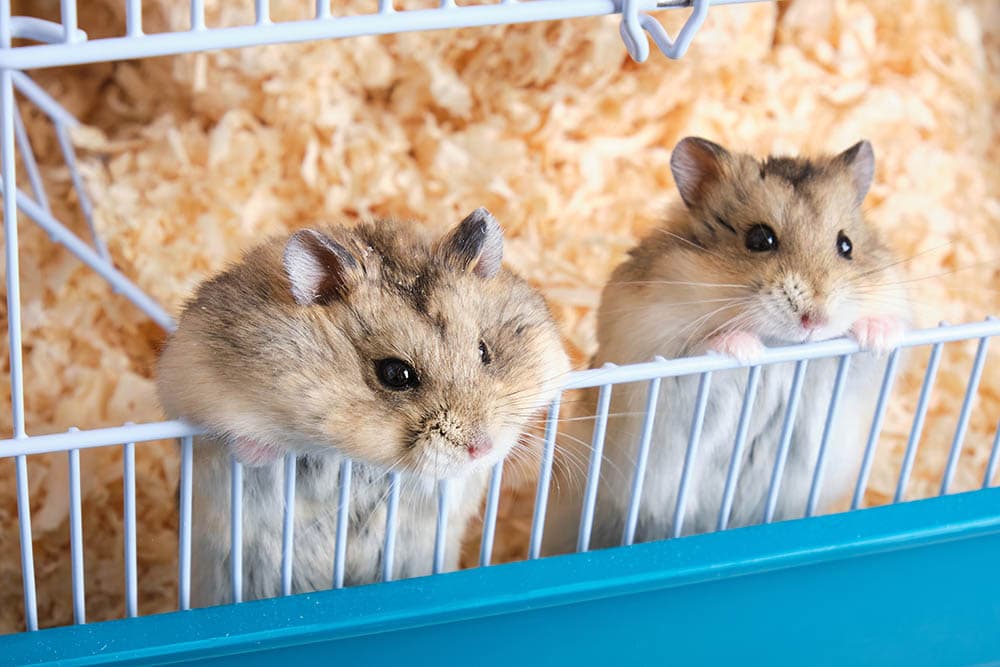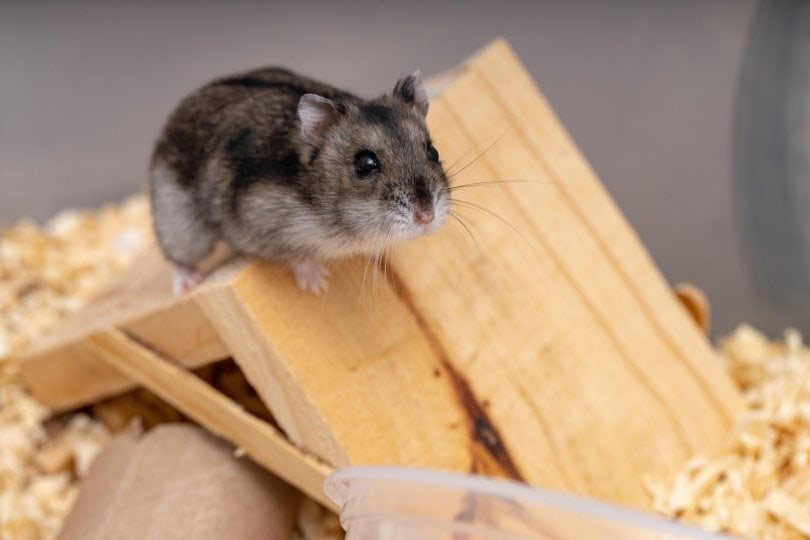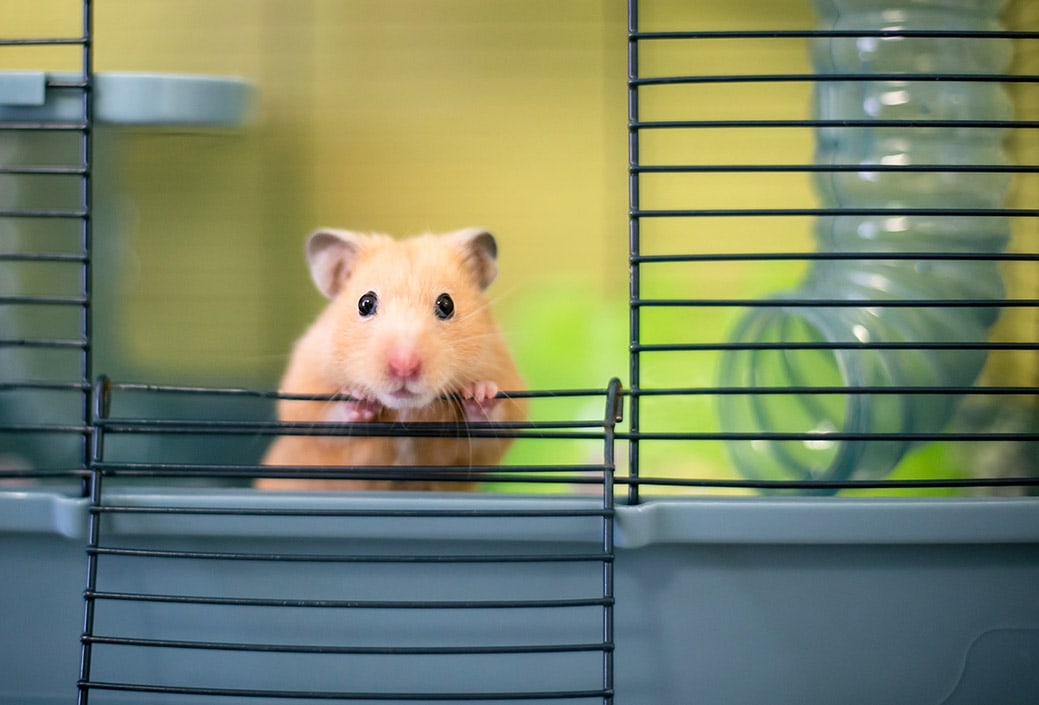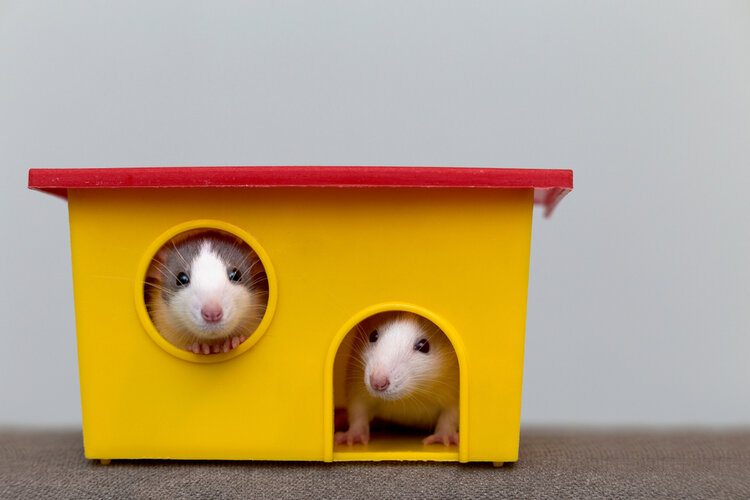
Hamsters are fun pets to take care of. They require less physical space than cats or dogs, and are smaller and more contained, which makes them great first pets for children. Hamsters can live comfortably in a caged habitat, and there is no need to worry about them running loose around the house.
However, like any other animal, a hamster can become distressed for a variety of reasons. A distressed hamster tends to get restless and may stop eating or doing their normal activities. Fortunately, depending on the situation, there are several things that you can do to calm your hamster down when they are showing signs of distress. Here are 12 ideas to consider.
The 12 Tips to Calm Down a Hamster
1. Speak in a Gentle Voice
Sometimes, all it takes is a gentle voice to get a hamster to calm down. If you notice that your hamster becomes distressed when there is a great deal of commotion going on in your home, try taking them into a quiet room and using a gentle voice to interact with them until they calm down and start relaxing. Use words with intention and avoid displaying impatience.

2. Practice Patience
Patience is key when it comes to dealing with a hamster in distress. No matter what the situation is, it is crucial to keep your temper in check and ensure that you don’t raise your voice or yell in the vicinity of your hamster so as to not make them more distressed than they already are. The more patience you display, the quicker and easier it should be for your hamster to calm down.
3. Introduce New Toys
Introducing a new toy or two to your hamster’s environment can help take their mind off whatever is distressing them and give them a more enjoyable habitat overall. Try new toy options that your hamster has never interacted with before to ensure a new experience that invigorates your hamster’s senses and gives them an outlet for their emotions.

4. Add New Bedding to Their Cage
If your hamster’s habitat is not comfortable, it can make your hamster feel distressed and unhappy. If you haven’t cleaned the habitat out lately, it’s a good idea to consider doing so. Adding new bedding material to the habitat can make a world of difference when it comes to the comfort of your hamster. Utilize an absorbent bedding option like paper pellets or soft hay that will help keep the habitat clean and dry between changings.
5. Incorporate New Hiding Spaces
Hamsters occasionally need a place to get away and hide from the commotion that’s happening in the household. If your hamster doesn’t have a safe place to hide, they may show signs of distress as time goes on.
Hamsters are naturally inclined to hide themselves from potential predators, and if they can’t do so, they may feel unsafe and vulnerable overall. Try providing your hamster with a small box that has a hole in it for them to hide away in. Alternatively, you can put a toilet paper roll in their habitat for more privacy. Other options include empty tissue containers, plastic tunnels, and tree branches.

6. Play Relaxing Music
Your hamster can hear everything that you hear, and the noises that they are exposed to can either make them feel stressed out or give them a sense of peace and calm. Playing relaxing music may help calm your hamster down whenever they seem distressed. Classical music is an excellent choice but not the only one. If you aren’t sure what music to play for your hamster, try a curated soundtrack designed just for hamsters.
7. Enhance Their Habitat Size
Your hamster can start to display signs of stress if their habitat is too small. A hamster needs enough room to explore, hide, eat, and use the bathroom in areas away from where they spend the majority of their time. If it seems that your hamster is trying to go beyond their habitat boundary or is constantly moving back and forth between the walls, consider investing in a larger habitat or adding to their current habitat in some way.

8. Give Them Something New to Do
Sometimes, all it takes is a bit of entertainment to calm a hamster’s mind. Giving your hamster something new to do is a great way to ensure that they are entertained and happy or to keep their mind calm if they are acting stressed due to boredom. There are even DIY hamster toys that you can make yourself.
9. Dim the Lights and the Noise
If your hamster shows signs of stress when the household is particularly bright and/or loud, like when you have guests over for dinner or a birthday party for your child, you can calm them down by dimming the lights and the noise in the room that they’re in. If possible, take your hamster to a room where guests are not present. If moving the hamster is not possible, shift the party or activity to a different room, and ask anyone who goes into the hamster’s area to use library voices.

10. Keep Other Animals Away
If you have other animals living in the house, your hamster may feel distressed whenever those animals come near their habitat, especially if the animals show any interest in them. Keeping the other animals away can help your hamster stay calm as time goes on. Either put the hamster in a room where the door can stay closed so other animals can’t get in, or place their habitat high up on a table or shelf where other animals cannot reach them.
11. Thoroughly Clean Their Habitat
If it is not clear why your hamster is in distress or seems to need calming, try thoroughly cleaning their habitat. Take everything out of the habitat and disinfect the walls. Wash all the toys, tunnels, and other items. Throw the food and water dishes in the dishwasher. Add brand new bedding before putting everything else and your hamster back in.

12. Focus More on Exercise
Making sure your hamster gets plenty of exercise each day should help calm their body and mind in general. In addition to including a hamster wheel in their habitat, you can put them in an exercise ball and let them run around the house. Create an obstacle course for your pet with toilet paper rolls. You can even give them a pot of soil to dig in.
Conclusion
Keeping your hamster calm will help ensure that they enjoy a happy and healthy life. Hopefully, the tips and tricks outlined here will help you beat boredom and stress. Mix and match the options until you find what works best for your hamster.
Featured Image Credit: Derek Sewell, Pixabay







